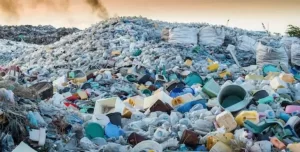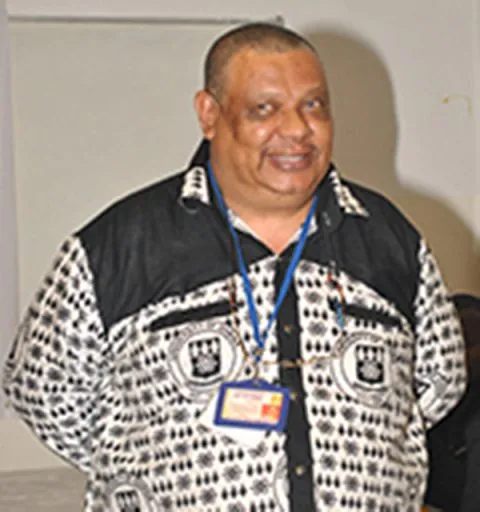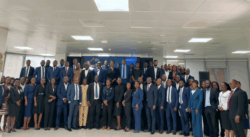By Kingsley Webora TANKEH
Panellists at the just-ended Environmental Sustainability Summit 2025 concurred that the precarious plastic pollution situation in Ghana continues to worsen due to a disjoint between policy and its implementation and lack commitment to promoting investments in viable alternatives.

As the country grapples with plastic pollution and seeks to advance circular economy practices, the panellists warned that progress is being hampered by a disconnect between policy and implementation, as well as a gap between academia and practical application – challenges largely attributed to lack of reliable data for effective planning.
Ghana generates 1.1 million tonnes of plastic waste each year.
Estimates show that over 50 percent of this waste remains uncollected and as low as 9 percent is recycled.
This waste ends up on the streets – clogging drains causing floods, contaminating fisheries and causing health issues.
According to the Minister of Environment, Science and Technology, Dr. Ibrahim Murtala Mohammed, plastic waste costs the economy a whopping US$6billion annually, which represents about 11 percent of Ghana’s GDP.
The Director-Institute for Environment and Sanitation Studies, University of Ghana, Prof. Chris Gordon argued that despite the presence of national plastic management policies and an action plan road map – which he played a pivotal role in formulating – Ghana is drowning in plastic waste because it fails to implement solutions, setting the tone for a passionate debate.
“We have all the plans, we have all the policies. The real issue is implementation,” Prof. Gordon stated, adding that “academia and policymakers are speaking different languages.”
He therefore called for simplified communication devoid of technical jargons that alienate and preclude the understanding of policymakers and people in our communities.
“Environmental sanitation policy does not talk about waste, it says ‘MINT’ – Materials in Transition. We need knowledge brokerage,” he said, stressing that complex research findings should be repackaged for practical use.
Despite the absence of reliable data, especially on the use of single-use plastics, Prof. Gordon claims that we consume about 30 million sachets of water daily in Accra, considering the city’s burgeoning population which now stands at about 5 million.
“We need policies backed by evidence,” he noted, emphasising the importance of reliable figures to guide policy and track implementation efficiency.
A youth activist at Thinking Minds Ghana, Nana Akosua Korang Agyare, urged support for grassroots youth innovation to improve visibility and effect change.
“We have the skills and the knowledge. But we need funding, we need visibility.”
She called for tailored, community-specific support rather than top-down, one-size-fits-all approaches to ensure efficiency.
Prof. Gordon echoed similar sentiments: “We need to catch them young,” Gordon urged.
He further noted the need for behavioural change to tackle the plastic pollution menace.
He therefore passed the mantle down to the younger generation:
“I say to my students, it is your problem. You have to come with the innovation to fix it because you are the people who have to live with it,” he said
The researcher criticised the divide between social and natural sciences in tackling what he called a societal “mental problem”.
“Doing the same thing over and over and expecting different results is insanity.”
Representing Jospong Group – the largest waste management company in Ghana – Rev. Dr. Glenn Kwabena Gyimah, General Manager-Jospong Green Transition Office, spoke at length about his outfit’s commitment to decentralised and community-based recycling models to improve the situation in both urban and rural Ghana.
However, the engineer highlighted significant barriers to private participation in Ghana’s waste management; including critical financing challenges and difficulty in formalising the massive informal waste sector.
Dr. Eric Boachie Yiadom from Green Vista expressed concern about the investment climate.
He argued that policy inconsistency and lack of government commitment create undue political risks.
“If an investor brings cars, builds capacity and then the contract is suddenly cancelled, what do they do? This tells investors the political risk is too high,” he noted, alluding to government’s failure to renew Jospong’s contract with YEA.
However, he concurred with Edward Debrah, a Chartered Environmentalist, on the need for incentives like tax breaks for recyclers or importers of biodegradable alternatives, while disincentivizing the use of single-use shopping bags by selling them to customers instead of the usual free after purchase.
Debrah bemoaned the enforcement culture in Ghana, linking it to a broader development paradox: “A white man once asked me: your country has almost everything, why are you not developed? We have the laws. The challenge has always been enforcing those laws”.
He advocated simplified, translated regulations and efficient regulatory oversight to ensure compliance, while contrasting it with the strict Health and Safety Executive (HSE) enforcement he witnessed in the UK.
“We see nice speeches, best practices from elsewhere. Then we come home and catch ‘yawa’ [trouble]. We are not enforcing anything.”
The Environmental Sustainability Summit 2025 was organised by the Business and Financial Times on the theme ‘Ending plastic waste in Ghana: A sustainable future for all’.










